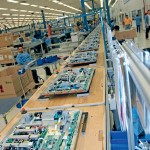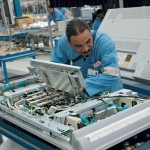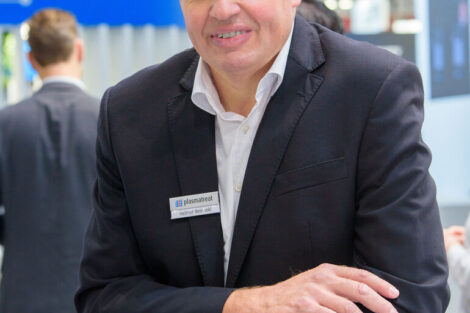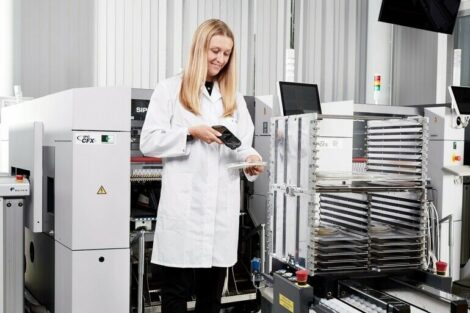Production of flat panel televisions (FTV) requires a production facility, equipment, and skill set not found in many electronics manufacturing services (EMS) companies. Just handling and maneuvering a highly breakable and sensitive 132 cm (52 in.) flat panel display is challenging. Balancing the sourcing of the parts to get the best prices and quality while securing all the parts needed simultaneously with minimal inventory requires a finely orchestrated supply chain. The EMS in this role no longer handles just the assembly of printed circuit boards and sub-assemblies. The EMS must possess the electrical and mechanical engineering skills to properly align the FTV and perform complete final assembly and test.
Strong growth is anticipated in the flat panel television market. Between 2005 and 2010, the compound annual growth rate (CAGR) is expected to increase 43 % for liquid crystal display (LCD) TVs and 23 % for plasma display panel (PDP) TVs, while the EMS and original design manufacturer (ODM) market in home communications is projected to grow at 7 % annually. (Source: Analysts compiled by Elcoteq.) With this business climate, Elcoteq, the largest European EMS company, took over Philips’ flat panel TV assembly operation in Juarez, Mexico. Elcoteq acquired the shares of Productos de Consumo Electrónico Philips, S.A. de C.V. on September 4, 2008. The deal included acquisition of the manufacturing assets, inventories, the lease of the factory space, and the local workforce. Housed in a 21,065 square-meter facility, the plant employs about 740 people and is located close to the U.S. border in Juarez, Chihuahua. Through the Juarez plant, Elcoteq now offers LCD final assembly services as well as engineering and related new product introduction (NPI), supply chain management, and sourcing services.
LCD televisions in sizes ranging from 66 cm to 132 cm (26 inches to 52 inches) are the main products being manufactured at the Juarez plant, although plasma, cathode ray tube (CRT), projection, and digital light processing TVs have been produced there and capabilities exist for both light emitting diode (LED) and organic light emitting diode (OLED) TVs and set-top boxes. The plant produces up to 6000 flat panel televisions a day; however, the capacity can be doubled without extra investment. The majority of televisions are being shipped to the United States, with Mexico, South America, and Canada as secondary markets.
The manufacturing concept in Juarez is based on a full flow line concept, focused on speed and short throughput time, taking just an hour for a flat TV panel to be assembled, aligned, tested, packed, and loaded as a finished product to be shipped to the customer. A highly productive workforce of production operators, supported by electronic and mechanical engineers, provides full technical support of the production and quality engineering.
Elcoteq’s acquisition of Philips’ FTV operation is an example of how home communications products that were traditionally designed and produced by the OEM can be transitioned to an EMS. It also demonstrates how companies are starting to rethink sourcing and logistics and more carefully scrutinizing localization for sourcing and manufacturing. Twelve years ago, when Elcoteq began working with Philips, its main function was assembly of PCBAs and sub-assemblies. With the acquisition of Philips, the responsibility for production of the finished FTV is now up to Elcoteq.
For many years, design for the flat panel televisions took place at the Philips design center in Singapore. As part of the Elcoteq/Philips agreement, Funai, a leading Japanese manufacturer of audiovisual equipment, bought the Philips United States and Canada TV business, so Funai is now Elcoteq’s customer and collaborating with Elcoteq on FTV design along with the Singapore center. Elcoteq also plans to participate in home communications product design with future original equipment manufacturer (OEM) customers.
Involvement with design is part of Elcoteq’s total cost of ownership concept using a design for manufacturing (Dfm) and design for x (Dfx) strategy. As an extension of the design phase, the Elcoteq engineers support what they call Accelerated Reliability Testing, which involves debugging the design and bringing a mature product to the market.
Sourcing and logistics is a major component of the new operation. Strategy has shifted from trying to acquire or manufacture all parts in China to a global concept that considers the location where the product will be distributed and used and logistics costs for the various parts. Shenzhen, China was the manufacturing hub and purchasing source for Elcoteq’s PCBAs in 2006. Now, the electronic components are still purchased in Asia, from Elcoteq’s own manufacturing plants in China, but larger items consumed at the Juarez plant, such as plastics, metals, and packing materials, are sourced locally. The sourced materials must arrive simultaneously, whether from around the corner or on the other side of the world, so they can be assembled, aligned, tested, and packed for shipment according to a firmly delineated schedule.
Maintaining inventory for large screen flat panel TVs is extremely costly and puts a strain on facility space; plus, it’s impractical to store such bulky materials. By having a defined and carefully calculated level of logistics control, the plant can operate on a just-in-time basis so the panels, which are very expensive, can be kept at the plant for as short a time as possible. The panels are purchased from suppliers in the Far East, who maintain inventory in hubs in El Paso, Texas, which is at the other side of the border of Juarez. Elcoteq pulls a panel one day ahead of production needs from the El Paso hub and only takes ownership at that point, the panel goes through production the next day, and gets in the hands of the customer the same day. Financing costs are reduced because the panels are kept in Elcoteq’s hands for such a short time.
Production of FTVs offers some extra challenges. The factory has to be equipped with manipulators to aid workers in lifting the heavy panels to certain positions in the line, especially as they have to be hoisted in the assembly line to an upright position for alignment, testing, and packing. Not only are the FTVs breakable, but they are expensive and used in living rooms, so the aesthetic quality of the television is important. High gloss finished areas are sensitive and have to be covered with protective tape to ensure they arrive to the consumer unblemished.
Reliability and quality control are critical to the success of flat panel television production, considering that the customer wants to have 100 % reliability over many years. All components must be matched, aligned, and calibrated to meet the required TV picture quality. Aligning supports final assembly and both final assembly and testing are integrated into the process. Testing protocols test the functionality and connectivity of all parts of the set. Reliability testing takes place over hundreds of hours to simulate the use of the TV by the consumer. Accelerated reliability testing includes the use of climate chambers to test television performance during humidity and temperature changes.
The assembly lines are supported by traceability systems for key components and integrated quality control systems. Once a FTV is out in the field, the traceability system can be used as a link to historical data to identify all aspects of the television’s parts and production.
Moving flat panel TV production from OEM Philips to EMS Elcoteq is proving to be a beneficial relationship to all. As Rob de Ridder, senior vice president for Philips said, “Our cooperative relationship with Elcoteq has now been running successfully for the last 12 years, and we are confident that Elcoteq will be an excellent partner as we continue to streamline our global supply chain for FTV products. Our move to transfer the Juarez operation to an experienced and leading EMS company in this field was a logical step in optimizing our supply base in the FTV business.”
www.elcoteq.com
EPP Europe 528
zusammenfassung
Die Herstellung von Flachbildschirmfernsehgeräten (FTV) setzt eine Produktionsstätte, Ausrüstung und Fachkenntnis voraus, die nicht in vielen EMS Unternehmen zu finden sind. Der Auftragsfertiger muss über die entsprechenden Ingenieurs- und mechanischen Fachkenntnisse verfügen, um die Flachbildschirmfernseher sachgerecht auszurichten und die vollständige Endmontage und den Test zu leisten. Elcoteqs Akquise von Philips FTV-Zweigwerk ist ein Beispiel dafür, wie Heimkommunikationsprodukte, die traditionellerweise von OEMs entwickelt und gefertigt wurden, von einem EMS Anbieter übernommen werden können.
La fabrication de téléviseurs à écran plat (FTV) implique des ateliers de production, un équipement et des connaissances spécialisées que l’on trouve chez peu d’entreprises EMS (services de fabrication de produits électroniques). Le sous-traitant doit disposer des connaissances spécialisées nécessaires dans les domaines de l’ingénierie et de la mécanique afin de pouvoir positionner correctement le téléviseur à écran plat, procéder au montage final complet et tester l’appareil. L’acquisition par Elcoteq de la section FTV de Philips montre comment un fournisseur EMS est capable de prendre en charge des produits de communication domestique dont le développement et la fabrication sont traditionnellement réservés aux OEM (équipementiers électroniques).
La produzione di televisori a schermo piatto (FTV) richiede uno stabilimento produttivo, attrezzature e conoscenze di cui molte aziende EMS non dispongono. Il responsabile della preparazione dell’ordine deve avere le conoscenze ingegneristiche e meccaniche per allineare correttamente i televisori a schermo piatto ed effettuare il montaggio finale ed il collaudo. L’acquisizione da parte di Elcoteq del settore FTV di Philips è un esempio di come i prodotti normalmente progettati e prodotti da OEM possano passare ad un fornitore EMS.
Share:











